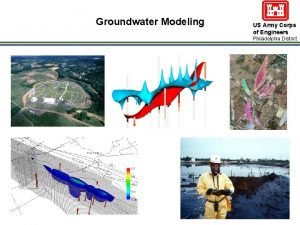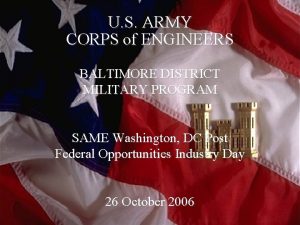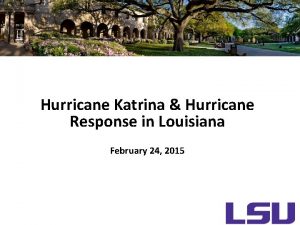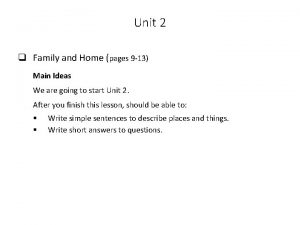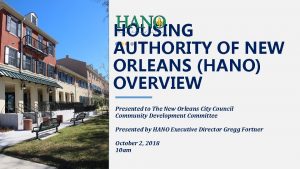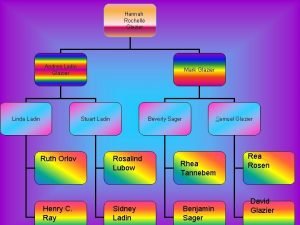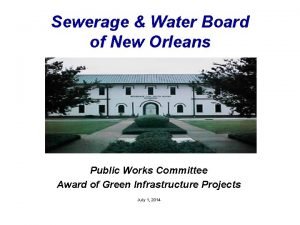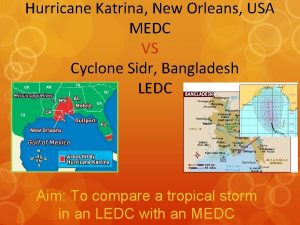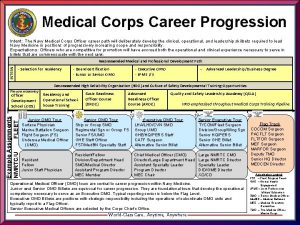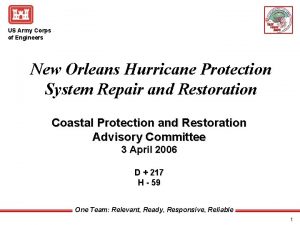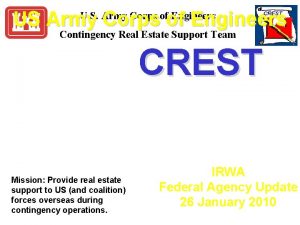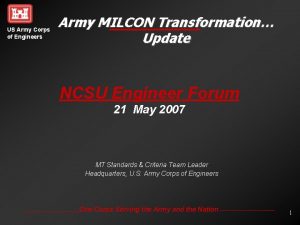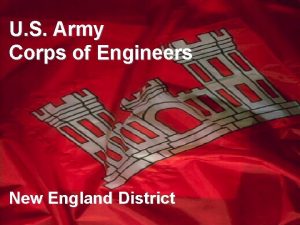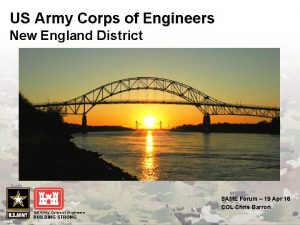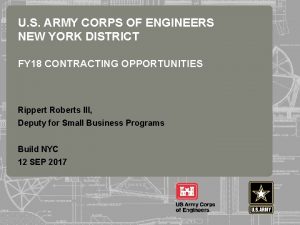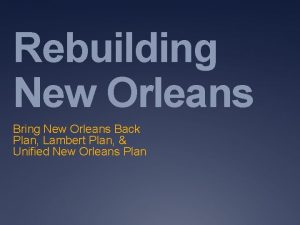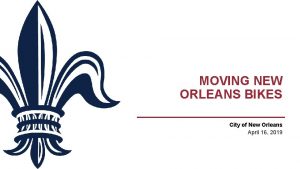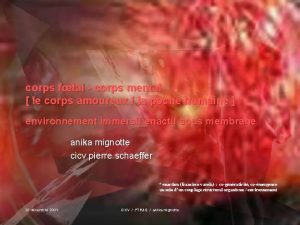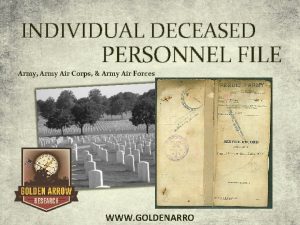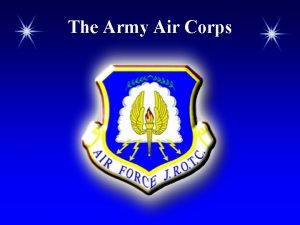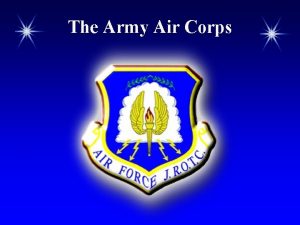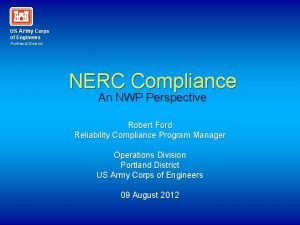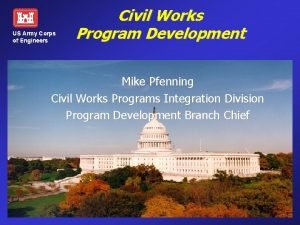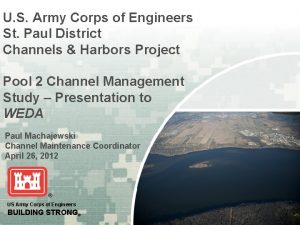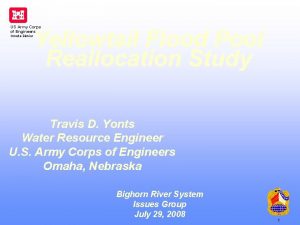U S Army Corps of Engineers New Orleans




















- Slides: 20

U. S. Army Corps of Engineers New Orleans District Engineer Circular 1165 -2 -216 Request to Alter USACE Projects Section 408 Permissions Amy E. Powell Operations Manager, Completed Works 408 Coordinator New Orleans District

Background EC 1165 -2 -216, Policy and Procedural Guidance for Processing Requests to Alter US Army Corps of Engineers Civil Works Projects Pursuant to 33 USC 408 - Provides the Secretary of the Army authority to grant permission to alter a USACE civil works project if: • • 2 Does not impair usefulness of the project Not injurious to the public interest

Purpose of EC Improve consistency in the way USACE considers, processes, and documents decisions for requests for alterations to Civil Works projects. Create a process that is applicable to all types of Civil Works projects. a. Create a process that can be tailored by districts to the appropriate scope, scale, and complexity of a proposed alteration. b. Be transparent on what information is required. 3

What does this EC apply to? • • • All USACE Civil Works projects Actions that build upon, alter, improve, move, occupy, or otherwise could affect the federal project. Alterations within real estate interests of the federal project • No 408 authority to regulate outside of project ROW. • EC DOES NOT APPLY TO: • Routine operations and maintenance activities • Shoreline Management and Master Planning Programs • Certain Real Estate Outgrants 4

Basic Layout of the EC The main EC applies to all Section 408 requests The appendices provide supplemental guidance - • • a. Dams and Reservoirs (including Navigation Dams) b. Non-Federal Hydropower Development c. Levee, Floodwall or Flood Risk Management Channel Projects – Appendix D d. Navigation Channels, Harbors, Locks, Jetties, Bridges, and Features e. System Performance Analysis f. Accepting funds through Section 214 5

Basic Steps Step 1: Pre-Coordination Step 2: Written Request Step 3: Required Documentation (analysis/design, H&H, NEPA Compliance, Real Estate, EO 11988 flood plain development, O&M impacts). Step 4: District Agency Technical Review Step 5: Summary of Findings Step 6: Division Review, if required Step 7: HQ Review, if required Step 8: Notification Step 9: Post-Permission Oversight 6

Team Members 1. 2. 3. 4. Non-federal sponsor Requester, if not the non-federal sponsor District Section 408 Coordinator Agency Technical Review (ATR) Team a. b. c. d. e. f. g. Operations/Project Management Engineering Real Estate Environmental Emergency Management Construction Division Office of Counsel 5. Appropriate Regional Integration Team 7

Non-Federal Sponsor’s Role Section 408 requests must come from and/or have written concurrence of the non. Federal sponsor (If there are multiple sponsors, each sponsor must provide concurrence). Must include: • Non-Federal sponsors endorsement of the proposed alteration. • Acknowledgment and acceptance of any new O&M requirements associated with the proposed alteration. • The non-Federal sponsor will acknowledge in writing their continued responsibility to OMRR&R the USACE project at no cost to the government and will hold and save the government free from all damages arising from construction, operation, maintenance, repair, rehabilitation, and replacement of the project. • Written statement from the non-Federal sponsor regarding whether in-kind credit will be sought. • Written statement of whether the requestor will require the use of Federally-owned real property or property owned by the non-Federal sponsor. Reminder that 33 CFR 208. 10 focuses on sponsors’ responsibilities. Decision to issue a Section 408 permission is a USACE responsibility. Processes for both can work together, but one does not replace the other. 8

Required Documentation from the Requester: a. Analysis/Design b. Hydrologic & Hydraulic System Performance Analysis c. NEPA Compliance d. Real Estate e. Discussions of EO 11988 Flood Plain Management f. O&M Impacts 9

Environmental Compliance • • • 10 EC states that a Section 408 decision is a federal action and NEPA and other environmental compliance is required. Scope of analysis limited to the federal project areas that would be directly or indirectly affected by proposed alteration. NEPA documentation – the requester’s proposal will be identified as the “requester’s preferred alternative. ” Alternatives analysis is limited to 1) no action and 2) requester’s preferred alternative. Categorical exclusions may apply Leverage existing NEPA documentation

District Agency Technical Review Upon Receipt of the Written Request with all required documentation, ATR review will begin: 1. Close Coordination with our Regulatory Branch when a proposed alteration also includes a 10/404/103 decision. a. Section 408 decision and Section 10/404/103 decision require separate decision documents. b. Leverage information between the two processes c. Categorical Permissions will likely be sought 11

District Review Plans (DRP) 2. DRP’s are very detailed plans that describe a District-led Agency Technical Review (ATR) of the Section 408 requests. Procedural Review Plans Alteration Specific Review Plans Requester Review Plan (if Type II IEPR is required) • • DRP’s will discuss: • • The USACE Project and the Proposed Alteration Risk Assessment of the proposed alteration. Documents the Rational for Type II IEPR Recommendations Review Level Determinations Note: DRP’s are endorsed by RMC and approved by the MVD Commander.

Review Requirements • Review requirements are determined by the district based on the scope and scale of the alteration. • The district is responsible to develop a review plan to cover the district’s review of the Section 408 request. • If it is determined that a Type II IEPR is required for the proposed alteration, the requester is responsible to develop a review plan (and quality control as determined by the district). • Cost of review by the District may be born by the requestor. 13

Decision Level • Delegation of authority: From ASACW to Chief of Engineers to Director, Civil Works • The Division has created a regional process • DCW has delegated certain Section 408 requests to the District Commanders • The required documentation is based on the alteration and should be the same regardless of decision level 14

Review Level? District/Division/HQ Review • 15 Questions in which the answer "yes" would require a Division/HQUSACE review and decision 1. Type II IEPR? 2. EIS? 3. Change how authorized purpose is met? 4. Impact study alternatives? 5. Crediting being sought? 6. Installation of hydropower facilities? 7. Will USACE assume O&M for the Nav alteration?

Summary of Findings ATR team will make determinations – § Impair the usefulness of the federal project § Injurious to the public interest § Legal and policy compliance § Provide Real Estate Certification After District Review is complete, the ATR team will document thru a “Summary of Findings”. • ATR Team makes a recommendation to the MVN Commander, then to MVD Commander. • The Division Commander has the ability to deny the request prior to reaching HQ. 16

Other Topics Permission Notification Post – Permission Oversight 17

Future Funding to Process Section 408 Request Up until now, all 408 request were reviewed and funded under ICW or O&M Project funding. a. Starting 2 nd Quarter FY 16 – We can no longer use ICW O&M General Funding to review 408 Permit request. b. Funds will be requested Nationally thru our RMC. c. If funding request are denied, we will have to pursue funding with our NFS Under Section 214 d. Amendment of EC Appendix G – now includes ability to enter into 214 agreements with non-fed public entities, public utility companies, and natural gas companies. 18

Bottom Line • • • 19 Alteration requests within ROW are the focus of EC 1165 -2 -216. Activities outside of the ROW requires close coordination between USACE and non-federal sponsors. Corps level of review will vary depending on the complexity of the proposed alteration. Corps will issue permission/denial directly to the requestor and the non-Federal sponsors. MVN will still provide technical engineering assistance/recommendations for permitted work outside of our Federal ROW but within 1500’ of the MR&T system and/or 300’ from the HSDRRS.

Section 408 QUESTIONS? 20
 Army corps of engineers philadelphia
Army corps of engineers philadelphia Army corps of engineers baltimore
Army corps of engineers baltimore She lit a candle in new orleans
She lit a candle in new orleans New orleans police foundation
New orleans police foundation What is the relative location of new orleans
What is the relative location of new orleans Hurricane gustav timeline
Hurricane gustav timeline My family lives at 3904 canal street in new orleans
My family lives at 3904 canal street in new orleans Record label in new orleans
Record label in new orleans Chapter 4 new orleans
Chapter 4 new orleans Ferrari rental houston
Ferrari rental houston Hano housing choice voucher program
Hano housing choice voucher program Andrea la rochelle
Andrea la rochelle Lsu new orleans pediatric residency
Lsu new orleans pediatric residency Aag new orleans
Aag new orleans Air mixed gas surface supplied diving new orleans
Air mixed gas surface supplied diving new orleans New orleans public works
New orleans public works Cow
Cow New orleans independent police monitor
New orleans independent police monitor Katrina tornade
Katrina tornade New orleans department of public works
New orleans department of public works Army medical service corps officer career progression
Army medical service corps officer career progression
